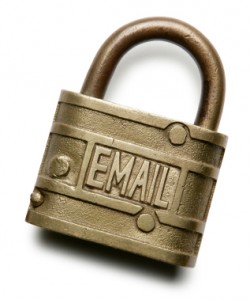 Though it should be common knowledge in this tech-savvy age, many people are still unaware that e-mail is far from private. Up until now, government and law enforcement could legally examine, store, and search your e-mail with no need for a warrant and without informing you. Many privacy groups hope that is about to change with the upcoming discussions about the Electronic Communications Privacy Act (ECPA) in Washington.
Though it should be common knowledge in this tech-savvy age, many people are still unaware that e-mail is far from private. Up until now, government and law enforcement could legally examine, store, and search your e-mail with no need for a warrant and without informing you. Many privacy groups hope that is about to change with the upcoming discussions about the Electronic Communications Privacy Act (ECPA) in Washington.
Google reported in its recent transparency report that in the first half of 2012 it received 20,938 requests from governments to hand over user data (including e-mail, searches, and other stored information). That represents a 50% increase from 2010. The U.S. government accounted for a full one-third of those requests.
The ECPA was written back in 1986 during the first stage of the digital revolution. The legislation was conceived of as a way of establishing the ground rules for law enforcement to access phone calls, voice mail, and the increasingly popular use of e-mail.
Because most people downloaded and stored their e-mail on a personal computer, by default, e-mail left on servers such as AOL for more than 180 days was considered abandoned. In the quarter decade since then much has changed about how people store and view e-mail. The current use of cloud storage has made the matter even murkier.
The Fourth Amendment protects citizens from unreasonable searches when there is a reasonable expectation of privacy, such as in personal letters kept in your home. However, the so-called “third-party doctrine” says that if you publicly expose information (as in your office), then you give up the expectation of privacy. Just as it is legal to search your trash in the bin outside your house or subpoena bank records, your Gmail is also subject to the third-party doctrine and you have therefore given up your privacy rights.
A recent Supreme Court ruling has left the door open to bringing things up-to- date for reasonable searches of e-mail. In a landmark decision, the Court ruled that there was an expectation of privacy against warrantless digital tracking of a person’s car. Wording in that decision suggests the Court may see the same issue applying to other digital information, such as e-mails and the data accumulated on smart phones.
While the collection of information is essential for law enforcement to do its job, obtaining a court warrant is a reasonable safety net to protect our rights as the Founding Fathers intended. Texts, handwritten letters, e-mails on your computer, phone calls, and Gmail in the cloud should be seen as equivalent in terms of the expectation of privacy.
Privacy groups and a diverse range of concerned citizens hope the ECPA will begin to get an overhaul as the Senate Committee on the Judiciary begins discussing the issue this Thursday.